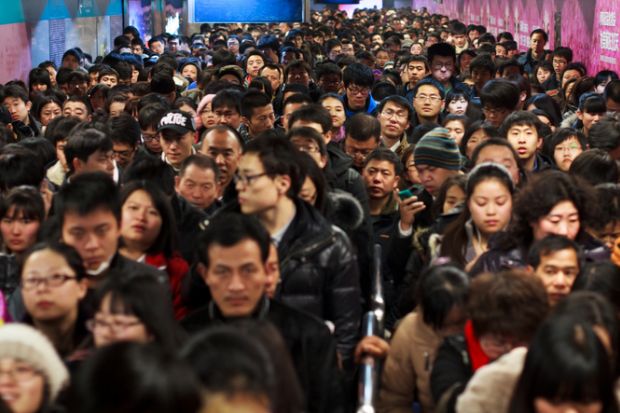Rapid expansion of postgraduate enrolment is forcing Chinese universities to abandon their “boarding school” model of providing on-campus accommodation for all students.
Institutions have long provided subsidised dormitories, which cost significantly less than private off-campus options: at Fudan University, for example, on-campus accommodation costs master’s students between 800 yuan (£88) and 1,600 yuan annually, while a single room off campus could cost more than 4,000 yuan.
But the topic has become the subject of significant debate after institutions including Peking University announced that students on professional postgraduate degrees – programmes focused on particular professions, such as MBAs and master’s in engineering, medicine and public administration – would not be eligible for on-campus accommodation.
At least 10 other universities have stated that students on professional postgraduate degrees will have no or limited access to on-campus accommodation, including Fudan and Beijing Normal, Nanjing, Nankai and Xiamen universities.
“It will become normal that higher education institutions will no longer provide graduate student dormitories,” writes Bao Wanqing, a research fellow at Qinghai Normal University in an opinion article.
According to an annual report on postgraduate enrolment, the number of Chinese students on professional postgraduate degrees more than tripled, from 197,000 in 2012 to 649,000 in 2021, representing nearly 62 per cent of all master’s admissions. China’s Ministry of Education has set a target of increasing that proportion to two-thirds by the end of 2025.
“I do know that many universities’ professional master’s students have exceeded the number of academic master’s students, with the former often being full-time employees,” said Yingyi Ma, director of Asian studies at Syracuse University. “Universities prefer these kinds of professional programmes, as they are cash cows.”
The number of students taking any kind of postgraduate degree in China has exploded in recent years in the face of a challenging job market. The number of sitters for the national postgraduate entrance exam hit 4.74 million in 2023, up from 2.4 million just five years earlier.
“The graduate boom is another manifestation of degree inflation in Chinese higher education. Many students could not find jobs or good jobs, so they try to get into graduate programmes,” Professor Ma said.
Register to continue
Why register?
- Registration is free and only takes a moment
- Once registered, you can read 3 articles a month
- Sign up for our newsletter
Subscribe
Or subscribe for unlimited access to:
- Unlimited access to news, views, insights & reviews
- Digital editions
- Digital access to THE’s university and college rankings analysis
Already registered or a current subscriber? Login








